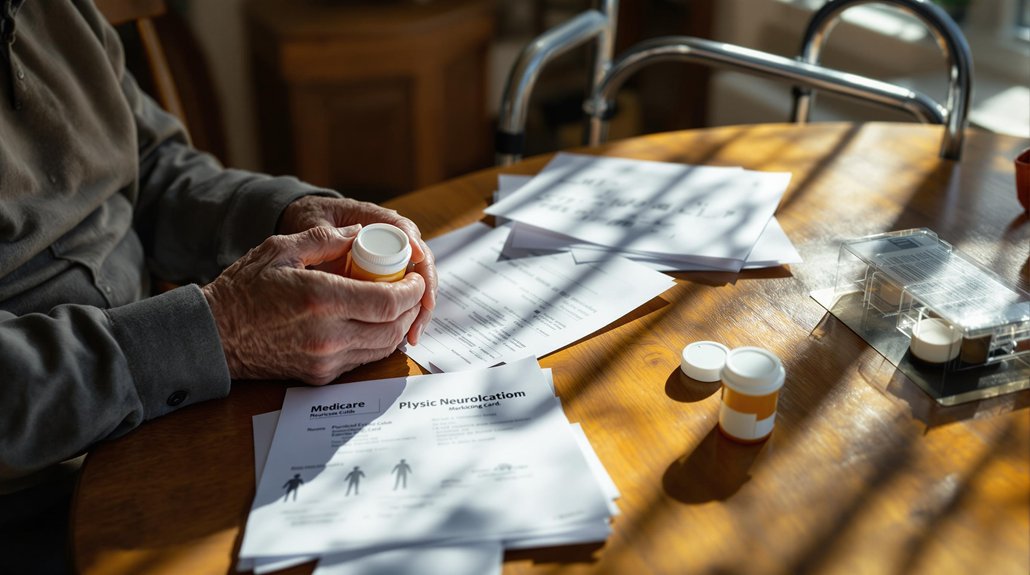People with Parkinson’s need a coordinated network of support across multiple areas. You’ll need medical professionals, including neurologists and specialists, to manage your treatment plan. Physical therapy and exercise programs help maintain mobility, while home care assistance aids with daily tasks. Don’t forget emotional support through counseling and support groups. Your family and community connections play a crucial role too. Understanding these support pillars will help you build a strong foundation for managing Parkinson’s effectively.
Medical Support and Treatment Team Coordination
When managing Parkinson’s disease, assembling a coordinated healthcare team is vital for thorough treatment.
You’ll need to work closely with neurologists, primary care physicians, and movement disorder specialists who can monitor your condition and adjust medications as needed.
Your medical support team should include physical therapists, occupational therapists, and speech therapists who can help maintain your mobility and daily functions.
Proper medication management is essential, so you’ll want to establish a reliable system with your pharmacist and doctors to track your prescriptions and timing.
Treatment accessibility may present challenges, so it’s important to identify healthcare providers within reasonable distance and coordinate transportation when needed.
Consider working with a care coordinator who can help organize appointments and guarantee smooth communication between all your healthcare providers.
Skilled nursing services through home care agencies can provide additional medical support while allowing you to maintain independence in your own home.
Physical Therapy and Exercise Programs
Regular physical therapy and exercise form three essential pillars in managing Parkinson’s symptoms: maintaining mobility, improving balance, and reducing stiffness.
You’ll find that working with a physical therapist who specializes in Parkinson’s creates a customized program that targets your specific needs.
To maximize therapy benefits, you’ll want to include a mix of activities: stretching exercises to reduce muscle tension, balance training to prevent falls, and aerobic workouts to boost overall fitness.
A comprehensive exercise plan combining stretching, balance work, and cardio creates the strongest foundation for managing Parkinson’s symptoms effectively.
Exercise motivation often increases when you join Parkinson’s-specific fitness classes or work out with a buddy.
You can support someone with Parkinson’s by helping them stick to their exercise routine, accompanying them to therapy sessions, and celebrating their progress.
Post-surgical rehabilitation and chronic pain management techniques can be incorporated into home-based therapy programs for enhanced comfort and convenience.
Daily Living Assistance and Home Care
As Parkinson’s symptoms progress, daily tasks like dressing, eating, and personal hygiene often become more challenging. You’ll need to adapt your home environment and establish daily routines that promote independence while ensuring safety.
| Daily Task | Support Solution |
|---|---|
| Dressing | Wide-grip buttons, elastic waistbands, slip-on shoes |
| Bathing | Grab bars, non-slip mats, shower chair |
| Meal prep | Weighted utensils, non-slip mats, electric can openers |
Consider home modifications that’ll make navigation easier, such as removing throw rugs and installing handrails in hallways. You might need personal care assistance for tasks like grooming, medication management, or light housekeeping. A professional caregiver can provide support while helping maintain your dignity and independence. They’ll work with you to develop strategies that make daily activities more manageable. Qualified caregivers provide safe, reliable assistance with daily living tasks while offering vital companionship to reduce social isolation.
Emotional and Mental Health Resources
Living with Parkinson’s disease takes a significant emotional toll, which is why accessing mental health support is essential for your overall well-being.
You’ll find valuable resources through licensed therapists who specialize in chronic conditions and understand the unique challenges you face.
Cognitive behavioral therapy can help you develop coping strategies for anxiety, depression, and stress that often accompany Parkinson’s. You’ll learn practical techniques to manage negative thoughts and maintain a positive outlook.
Support groups connect you with others who share similar experiences, providing a safe space to express your feelings and exchange helpful tips.
Support groups create vital connections, letting you share openly with others who truly understand your Parkinson’s journey.
Consider working with a mental health professional who can create a personalized care plan addressing both emotional and cognitive symptoms.
Many organizations offer online counseling and virtual support groups, making mental health resources more accessible than ever.
Our dedicated team provides crisis intervention services to help patients and families navigate emotional challenges during difficult periods.
Family and Community Support Networks
Building a strong support network can make a profound difference in managing Parkinson’s disease effectively. You’ll find that family engagement helps create a foundation of understanding and assistance, while community resources expand your circle of support.
| Support Type | Benefits | Action Steps |
|---|---|---|
| Family | Daily assistance, emotional support | Schedule regular family meetings |
| Local Groups | Shared experiences, practical tips | Join Parkinson’s support groups |
| Online Communities | 24/7 access, worldwide connections | Participate in forums |
Connect with others who understand your journey through local Parkinson’s organizations, support groups, and online forums. You’ll discover valuable resources, form friendships, and learn coping strategies from those who share similar experiences. Remember that caregivers and family members can also benefit from these support networks, strengthening their ability to help you. A personalized care assessment can help determine the specific support services and resources needed for your unique situation.
Conclusion
The path with Parkinson’s is like walking a long road – you don’t have to walk it alone. Working with doctors, doing exercises, and having support from family makes each step easier. Think of your care team as trusted guides helping you navigate daily challenges. When things get tough, reach out – just like you’d grab a friend’s hand to steady yourself. Everyone needs a helping hand sometimes, and that’s perfectly normal.
You have a whole community ready to support you. Focus Family Care understands your journey and stands ready to walk beside you, providing the care and support you need to live your best life.
If you or a loved one need help, don’t wait. Reach out to Focus Family Care today at (561) 693-1311 or email us at info@focusfamilycare.com.




